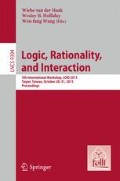Abstract
This paper continues a line of work that studies individual preference upgrades in order to model situations akin to a process of public deliberation in collective decision making. It proposes a general upgrade policy, presenting its semantic definition and a corresponding modality for describing its effects as well as a complete axiom system.
Access this chapter
Tax calculation will be finalised at checkout
Purchases are for personal use only
Preview
Unable to display preview. Download preview PDF.
References
Dietrich, F., List, C.: Where do preferences come from? International Journal of Game Theory 42(3), 613–637 (2013)
Dryzek, J.S., List, C.: Social choice theory and deliberative democracy: A reconciliation. British Journal of Political Science 33, 1–28 (2003)
Ghosh, S., Velázquez-Quesada, F.R.: Agreeing to agree: Reaching unanimity via preference dynamics based on reliable agents. In: Bordini, R., Elkind, E., Weiss, G., Yolum, P. (eds.) AAMAS 2015, pp. 1491–1499 (2015)
Burgess, J.P.: Basic tense logic. In: Gabbay, D., Guenthner, F. (eds.) Handbook of Philosophical Logic, vol. II, pp. 89–133. Reidel (1984)
Goldblatt, R.: Logics of Time and Computation, 2nd edn. CSLI Lecture Notes, no. 7. Center for the Study of Language and Information, Stanford (1992)
Gargov, G., Passy, S.: A note on boolean modal logic. In: Petkov, P.P. (ed.) Mathematical Logic, pp. 299–309. Springer US (1990)
Harel, D., Kozen, D., Tiuryn, J.: Dynamic Logic. MIT Press, Cambridge (2000)
Rott, H.: Shifting priorities: Simple representations for 27 iterated theory change operators. In: Lagerlund, H., Lindström, S., Sliwinski, R. (eds.) Modality Matters: Twenty-Five Essays in Honour of Krister Segerberg. Uppsala Philosophical Studies, no. 53, pp. 359–384. University of Uppsala, Upsala (2006)
van Benthem, J.: Dynamic logic for belief revision. Journal of Applied Non-Classical Logics 17(2), 129–155 (2007)
van Ditmarsch, H., van der Hoek, W., Kooi, B.: Dynamic Epistemic Logic. Synthese Library, no. 337. Springer (2008)
van Benthem, J.: Logical Dynamics of Information and Interaction. Cambridge University Press (2011)
van Benthem, J., Liu, F.: Dynamic logic of preference upgrade. Journal of Applied Non-Classical Logics 17(2), 157–182 (2007)
Grüne-Yanoff, T., Hansson, S.O.: Preference Change. Theory and Decision Library, vol. 42. Springer (2009)
van Eijck, J., Wang, Y.: Propositional dynamic logic as a logic of belief revision. In: Hodges, W., de Queiroz, R. (eds.) WoLLIC 2008. LNCS (LNAI), vol. 5110, pp. 136–148. Springer, Heidelberg (2008), doi:10.1007/978-3-540-69937-8_13
Baltag, A., Smets, S.: A qualitative theory of dynamic interactive belief revision. In: Bonanno, G., van der Hoek, W., Wooldridge, M. (eds.) Logic and the Foundations of Game and Decision Theory (LOFT 7). Texts in Logic and Games, vol. 3, pp. 13–60. Amsterdam University Press, Amsterdam (2008)
Ghosh, S., de Jongh, D.: Comparing strengths of beliefs explicitly. Logic Journal of the IGPL 21(3), 488–514 (2013)
Wang, Y., Cao, Q.: On axiomatizations of public announcement logic. Synthese 190(18), 103–134 (2013)
van Benthem, J., van Eijck, J., Kooi, B.: Logics of communication and change. Information and Computation 204(11), 1620–1662 (2006)
Baltag, A., Moss, L.S., Solecki, S.: The logic of public announcements and common knowledge and private suspicions. In: Gilboa, I. (ed.) Proceedings of the 7th Conference on Theoretical Aspects of Rationality and Knowledge (TARK 1998), Evanston, IL, USA, July 22-24, pp. 43–56. Morgan Kaufmann (1998)
Author information
Authors and Affiliations
Corresponding author
Editor information
Editors and Affiliations
Rights and permissions
Copyright information
© 2015 Springer-Verlag Berlin Heidelberg
About this paper
Cite this paper
Ghosh, S., Velázquez-Quesada, F.R. (2015). A Note on Reliability-Based Preference Dynamics. In: van der Hoek, W., Holliday, W., Wang, Wf. (eds) Logic, Rationality, and Interaction. LORI 2015. Lecture Notes in Computer Science(), vol 9394. Springer, Berlin, Heidelberg. https://doi.org/10.1007/978-3-662-48561-3_11
Download citation
DOI: https://doi.org/10.1007/978-3-662-48561-3_11
Published:
Publisher Name: Springer, Berlin, Heidelberg
Print ISBN: 978-3-662-48560-6
Online ISBN: 978-3-662-48561-3
eBook Packages: Computer ScienceComputer Science (R0)

